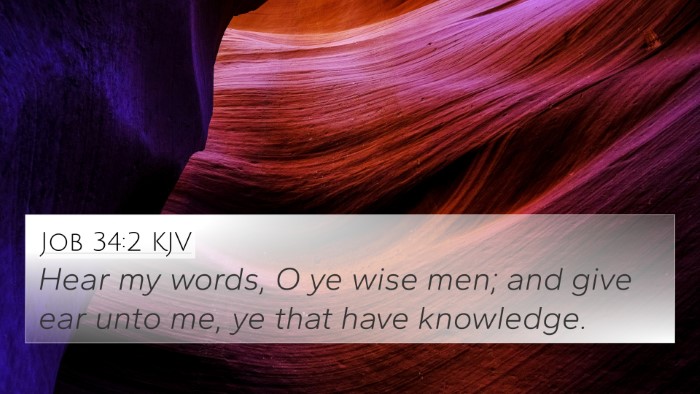Understanding Job 33:1
Job 33:1 states: "But now, O Job, hear my speeches, and hearken to all my words." This verse is part of a larger discourse by Elihu, one of the younger companions of Job, who had been waiting for the older friends to finish their arguments. In this context, Elihu is about to present his perspective on Job's suffering and God's purpose in it.
Insights from Public Domain Commentaries
-
Matthew Henry:
Henry emphasizes the importance of listening attentively to wisdom and truth that may come from unexpected sources. Elihu represents a fresh perspective, urging Job to consider his perspective seriously. This moment marks a transition in Job's journey as he is called to reflect rather than defend himself.
-
Albert Barnes:
Barnes highlights that Elihu’s address is both respectful and serious. He acknowledges Job's suffering but appeals for Job's attention to his words as they carry insights that could potentially lead to understanding and resolution. This speaks to the broader theme of communication during trials.
-
Adam Clarke:
Clarke elaborates on the implications of Elihu’s role in the narrative. He is seen not only as a comforter but also as a prophet, who has an important message concerning Job’s relationship with God. Elihu’s call for listening signifies the need for humility when confronted with divine truths.
Thematic Connections
This verse can be connected to several themes in both the Old and New Testaments. It encourages the reader to consider:
- The necessity of dialogue and listening in the face of suffering.
- The role of younger voices in discussing profound matters.
- A call to understand God's nature and intentions during difficult times.
- The importance of faith in understanding one's hardships.
Bible Verse Cross-References
Job 33:1 finds connections with various other Scriptures including:
- Proverbs 1:5: "A wise man will hear, and will increase learning; and a man of understanding shall attain unto wise counsels."
- Ecclesiastes 3:7: "A time to rend, and a time to sew; a time to keep silence, and a time to speak."
- James 1:19: "Wherefore, my beloved brethren, let every man be swift to hear, slow to speak, slow to wrath."
- Psalms 23:3: "He restoreth my soul: he leadeth me in the paths of righteousness for his name's sake."
- Job 42:5: "I have heard of thee by the hearing of the ear: but now mine eye seeth thee."
- Isaiah 29:18: "And in that day shall the deaf hear the words of the book, and the eyes of the blind shall see out of obscurity, and out of darkness."
- Matthew 11:15: "He that hath ears to hear, let him hear."
Conclusion
Job 33:1 serves as a critical point in the dialogue of Job's story. Elihu's appeal to listen opens the way for deeper exploration into suffering and divine purpose. As readers of Scripture, we are reminded of the significance of listening and the value of every voice, particularly in the context of faith and understanding.






